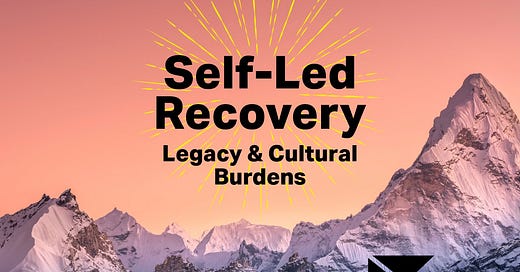Not everything you carry is yours.
Some of the pain, fear, shame, and pressure that live inside your system didn’t start with you. They were passed down—through words, behavior, silence, and culture. As children, we absorb what’s modeled. As adults, we begin to question what we’ve inherited.
This week is an invitation to gently explore what burdens you’re carrying on behalf of your family, your culture, and the society around you—and to consider: Do I still need to hold this?
“Much of our pain does not start with us. The traumas of our ancestors and the messages of our culture live inside us, shaping our parts before we even have words for them.”
— Adapted from Pete Walker, Complex PTSD
Understanding Legacy Burdens
Legacy burdens are inherited from our family lineage. They can be beliefs, emotions, survival strategies, or unspoken rules passed down for generations. These burdens often come from past trauma, poverty, war, immigration, addiction, mental illness, or emotional neglect.
You might carry these legacy burdens through parts that say:
“I’m not allowed to rest.”
“If I speak up, I’ll be punished.”
“I’m responsible for everyone else’s wellbeing.”
“Being vulnerable is dangerous.”
Even if no one explicitly told you these things, your parts may have picked them up to stay safe, accepted, or loved.
Understanding Cultural Burdens
Cultural burdens come from the broader systems we live in—race, gender, religion, class, nationality, and social norms. These burdens can shape our parts from a young age, influencing how they see themselves and what they believe is possible or allowed.
Parts carrying cultural burdens may hold beliefs like:
“My value depends on my productivity.”
“I must be strong at all times.”
“People like me don’t get to be safe, seen, or successful.”
“Expressing emotion is weak.”
Cultural burdens are often internalized without us even realizing it. A part may be trying to protect you from judgment or rejection, but its belief is rooted in a system, not your truth.
“The nervous system doesn’t distinguish between personal trauma and cultural trauma—both shape the way we survive, relate, and belong.”
— Deb Dana, Anchored
Why Parts Hold These Burdens
Your parts didn’t choose these burdens—they inherited them. And they often hold them out of love, loyalty, and survival. A part may believe:
“If I keep doing what’s expected, I’ll stay connected.”
“If I carry this pain, maybe no one else will have to.”
“If I follow the rules, I won’t be rejected.”
There is deep wisdom in this. Your system adapted to keep you safe. But now, as you become more Self-led, you have the opportunity to listen with compassion and ask: Is this still true for me?
Reflection Prompt
What is something you were taught—directly or indirectly—that no longer feels true?
Are there parts of you that carry pain or pressure from your family, ancestors, or cultural group?
What might change if that part didn’t have to carry it anymore?
What’s Next? Mapping Your Legacy and Cultural Burdens
On Wednesday, we’ll walk through a powerful mapping exercise to help you identify the messages and patterns your system may be carrying—and where they came from. This clarity is the beginning of freedom.
What’s one message or belief you suspect might not be yours? Share in the comments below—I’d love to hear what you’re uncovering.





Wonderful writing! Thank you. I believe I've inherited a belief/fear around medical issues. I have huge fear around being 'sick' and going for procedures. I have a part that tells me she continues the fear my mother felt around medical issues because she 'wants to get it right' and 'isn't that how we're supposed to feel?' I haven't made much progress in unburdening her completely and she's pretty active these days because I have a procedure coming up in April.